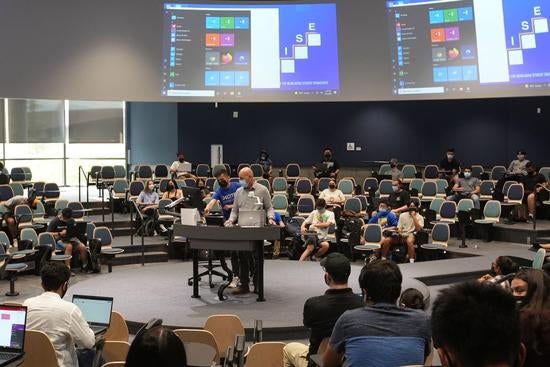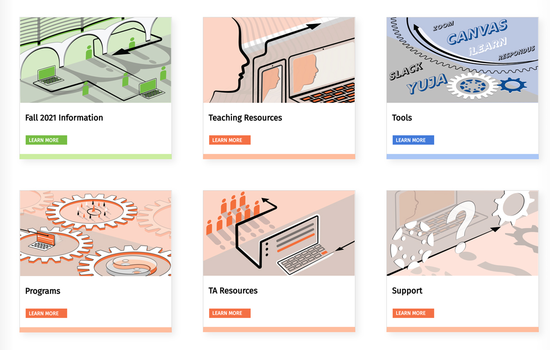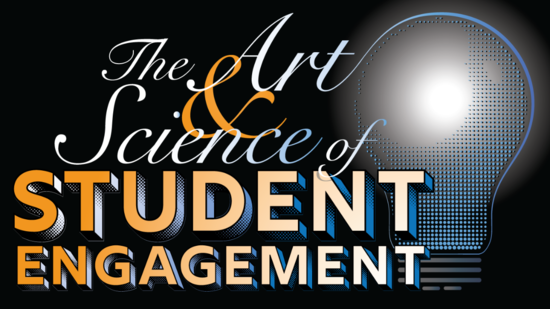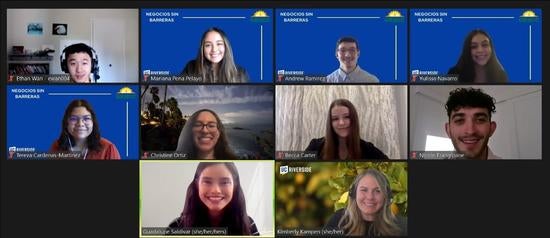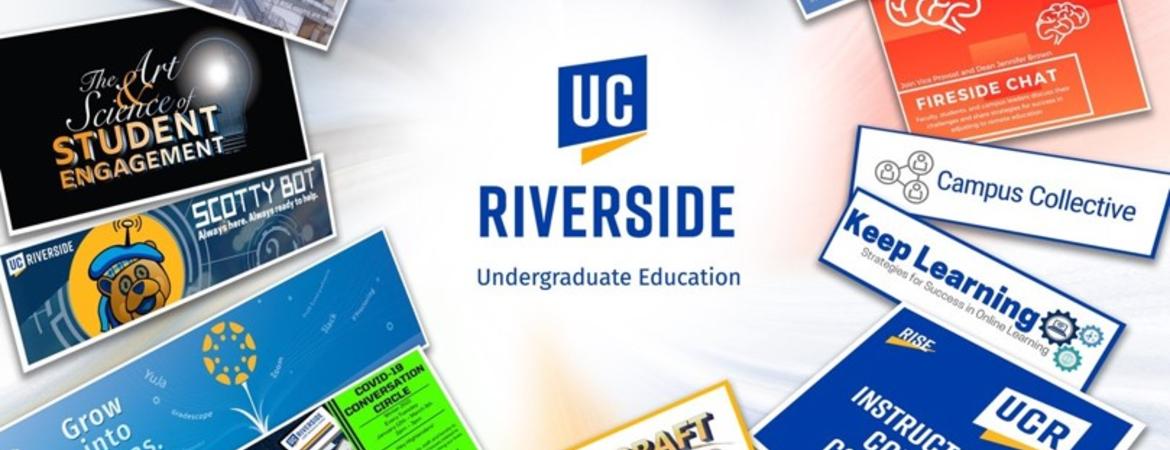
A Message from the Vice Provost and Dean of Undergraduate Education
January 2022
Dear UCR Community,
After enduring more than two years of the COVID-19 pandemic, UCR is once again in the midst of another quarter unlike any other. We are in a fluid environment and have begun Winter 2022 cautiously in light of the Omicron variant. UCR continues to consider the health and safety of our campus community and will resume in-person operations as soon as it is safe to do so. Since the start of the pandemic in March 2020, the students, staff, and faculty of UCR have watched the world change and have seen the impacts of the health, financial and social injustice crises. As we look to the future, the campus faces an important task of examining and discussing the consequences of the pandemic. What expectations do our students, campus partners, and communities have of higher education now? How have student lives changed and what impact will this “new normal” have on how we educate students? We have already seen that students want to connect with their professors and UCR staff more than ever before. They have shown that campus community is important and that following COVID protocols are a must so that we can all engage in a residential campus experience.
The journey UCR has taken from the start of the pandemic to now has not been an easy one. It has taken countless hours of hard work to ensure UCR is ready to face the challenges of a new academic year at a time unlike any other in the history of the university. The COVID-19 pandemic has compelled UCR and institutions globally to re-examine core operations and has spurred new and innovative collaborations. Our commitment to equity, retention, persistence, and student success has consistently served as our North Star, always guiding UE towards innovation. Along with our dedication to ensuring that students remain prepared, UE is focused on providing holistic support to faculty and staff and to improving instructional technologies based on pedagogically-sound best practices. This past summer, XCITE and ITS transformed 110 general assignment classrooms into RISE spaces, or Rooms for Increasing Student Engagement. This initiative gave the campus a chance to explore and integrate cutting-edge technology to improve the classroom experience for both students and faculty. Please watch this short video to learn more.
With the approval of several student success initiatives from the Higher Education Emergency Relief Fund (HEERF) in the fall, staff, faculty, and students have seen an increase in available support as we continue navigating through the pandemic. UE helped to guide HEERF funding related to student success initiatives based on national best practices. Our colleges and schools also brought key initiatives forward to expand writing support, increase support for undergraduate research, provide outreach to students who “stopped-out” during the pandemic, and improve technology and peer mentor support for academic advising. UE is proud of the seven key initiatives that represent the holistic interventions that have aided to increase the retention of students in 2021. Some of those initiatives include partnering with Student Affairs to expand welcome week activities for incoming students, partnering with the Basic Needs department and the Financial Aid office on emergency completion grants for students who have pandemic-related emergencies, and increased supplemental instruction and tutoring support. HEERF funding has also made it possible for the Academic Resource Center (ARC) to acquire technology to create “anytime/anywhere” tutoring support. Please see the link above for the full list of initiatives.
I hope the campus will join me in engaging conversations about the post-pandemic university and what it means for UCR.
All the best
Jennifer Brown, Ph.D.
Vice Provost and Dean of Undergraduate Education
Academic Excellence
RISE Classroom Upgrades Improve In-Person and Remote Learning
Underscoring UCR's commitment to faculty success and student social mobility, XCITE and ITS worked together to implement RISE, the Rooms for Increasing Student Engagement initiative. All 110 general assignment classrooms have been upgraded to facilitate:
- Enhanced participation: in-room Catchbox microphones allow for popcorn-style engagement and voice amplification;
- All-in-one audio: voice tracking microphones allow for both in-room and remote audio amplification;
- HD video: pan, tilt, and zoom with pre-set scenes allows for “set it and forget it” video recording or streaming;
- Seamless video conferencing: allows guest speakers to easily attend and present from anywhere; and,
- Synchronous learning: Zoom integration and two-way audio allow remote students to participate in real-time.
In the smaller RISE rooms that seat fewer than 60 students, the ceiling-mounted microphone arrays can pick up and broadcast all voices wirelessly, so neither instructors nor students need to wear or pass around a microphone. In the larger RISE rooms that seat more than 60, student conversations are captured using a Catchbox, a microphone wrapped in a soft, throwable encasement that makes classroom conversations interactive and fun. The document cameras allow instructors to share high-resolution images of objects and notes via the classroom projector and drop-down screens in the front of the room. Instructors can choose to share their classes with remote participants live via Zoom, or they can record their courses in YuJa and post lectures on iLearn or Canvas. The technology is managed at the classroom’s teaching station control panel—for example, with the simple push of a button, instructors can adjust the camera angle from a close shot of themselves teaching at the front of the room to a wide shot of all the students in the room.
Undergraduate Education would like to hear from instructors about their experiences in the RISE classrooms. Please share your feedback on this newest technology by sending an email to xcite-help@ucr.edu.
Instructional Continuity Consultants Champion Innovative Classroom Technologies
UE believes in student, faculty, and staff success. In connection with the RISE initiative, XCITE established a program in Fall 2021 to hire and train 44 experienced graduate students as Instructional Continuity Consultants, or ICCs, to find creative solutions to pandemic-related instructional issues. The program is continuing in Winter 2022 with 11 ICCs. The ICCs represent a wide range of academic programs and interests and use their unique connections and expertise to provide tailored support to instructors. The ICCs specialize in managing the digital learning environment using tools such as Canvas, YuJa, Gradescope, Poll Everywhere, Turnitin, and CiDilabs. ICCs perform a variety of roles both inside and outside of the classroom, which include:
- Providing technical and pedagogy support to faculty in RISE rooms;
- Migrating course content from iLearn to Canvas;
- Proactively engaging with faculty and departments to adjust course content as needed;
- Communicating updates to the campus community viaTeaching@UCR;
- Helping instructors manage remote class participants by overseeing Zoom sessions;
- Configuring portable equipment to livestream courses in non-RISE rooms to accommodate students unable to come to campus; and,
- Providing on-site support for the innovative new Student Success Center classrooms.
To request the support of an ICC, please email icc@ucr.edu.
The Keepteaching Website is Now Teaching@UCR: Your One-Stop-Shop for Teaching and Learning Assistance
XCITE has transitioned Keep Teaching to Teaching@UCR. Teaching@UCR will continue to serve as a comprehensive resource for instructors for academic technology updates and pedagogical best practices. Ongoing updates reflect the long-term teaching and learning goals at UCR as well as a new visual dashboard designed to make locating information and resources quicker and easier. The UCR instructional community can also sign up for online webinars to learn more about teaching and learning strategies and follow self-paced learning guides about UCR’s educational technologies.
Be sure to check Teaching@UCR often for new content, such as:
- Recordings of past webinars, trainings, and events in the Training Library;
- Registration links for upcoming webinars and workshops;
- Teaching Assistant resources; and
- Information on faculty development.
XCITE Partners with Faculty on Two California Education Learning Lab Innovation Grants
XCITE is partnering with PI Dr. Yat Sun Poon on a grant funded by the California Governor’s Office of Planning and Research, entitled A New Math Gateway. This grant focuses on closing the equity gap for STEM retention among underrepresented students while maintaining equity in time-to-degree. XCITE has provided fundamental support by making course materials, such as a customizable eBook, available in Canvas, which can then be shared across both the UC and California Community College systems. This technology provides instructors with the ability to monitor student performance and determine if additional instruction is needed.
The second grant, Enhancing Student Success via Active Adaptive Learning and Process-Oriented Guided Inquiry Learning in Introductory Engineering Classes, by Dr. Sundararajan Venkatadriagaram, enables researchers to explore the effectiveness and appropriateness of student performance and experience with adaptive learning technology. XCITE has developed the online platform and content consisting of interactive simulations, video lectures, and adaptive formative assessments. The interactive learning modules allow students to practice what they have learned and provide immediate feedback to help check for understanding. Each learning module has built-in functionality to collect student data, such as when they accessed the material, the amount of time spent in each interaction, and answers selected. Grades are pushed from the learning modules to the LMS, and student interaction information is sent to a dashboard displaying real-time data that instructors can view and analyze to identify opportunities to better assist students with mastery of course learning objectives.
XCITE Offers the Art and Science of Student Engagement Seminar Series, Available Online Now
The Art and Science of Student Engagement (TASSE), hosted by Cheryl Diermyer from XCITE and Ann Quinn from University Extension, is a seven-part series that explores concepts and best practices on how to engage students in remote, hybrid, and face-to-face courses. Topics include preparing your students to engage; pedagogy and technology of student engagement; diversity, equity, and inclusion; and engaging students in academic integrity practices. Recordings of these sessions are available online for faculty to learn at their own pace. To enroll, please register here.
Coming Soon from ADT: Nominate Your Colleagues for Teaching Awards!
The Academy of Distinguished Teaching (ADT) will be soliciting nominations for the Junior Excellence in Teaching (JET) Award and Innovative Teaching Award for the Winter 2022 quarter. Please begin thinking about who you might nominate for these awards. If you have any questions, please email Jack Eichler.
UWP’s WAFYA Simplifies Student Access to Support
The Writing and Foster Youth Alliance (WAFYA), a mentoring program that connects current and former foster youth at UCR with University Writing Program (UWP) faculty, improved access to services by launching a new website with several new features. Students can now request a consultation with a writing faculty mentor by submitting an easy online form, browse a searchable mentor list, and view quarterly program descriptions complete with Zoom links. The website has been streamlined to foster a more equitable environment where students can easily join scheduled writing labs, virtual study halls, and one-on-one consultations.
ARC Provided Second-Year Support with ACE and 2nd Nature in Fall 2021
In Fall 2021, The Academic Resource Center (ARC) offered a new program for sophomore students called 2nd Nature. This program helped second-year students who spent their first year at UCR in a remote environment and was made possible by one-time HEERF funds. The 2nd Nature program ran in conjunction with the Assistance, Coaching, and Encouragement (ACE) program and covered a range of topics including time management and study skills, gaining research and leadership experience, graduate school preparation, career development, and connecting with faculty. Student participants had the option of attending two quarterly seminars: “Public Speaking” and “Interpersonal Relationships.” The ARC also created a new seminar for ACE and 2nd Nature students, “Unmasking the Impostor Phenomenon,” to help students overcome feelings of inadequacy and self-doubt.
The ACE and 2nd Nature program also featured faculty-led workshops containing information about the faculty member’s research, interests, and experiences. The workshops were designed to encourage students to build relationships with peers and faculty. All rising second-year students were invited to participate and 151 students enrolled. For more information, please contact Elena Perez, Coordinator of Tutorial Assistance Programs and Academic Intervention.
Social Connections
Campus Collective Mentoring Program Guides Students by Text Message
In Fall 2020, Undergraduate Education launched the Campus Collective, a mentoring-by-text message program, to address social isolation and unfamiliarity with campus resources. Students connected to UCR student mentors by text message, which helped alleviate Zoom fatigue and built a greater sense of belonging. Mentors provided mentees with academic advice, social support, and resource referrals to campus support services. Overall, 36% of the freshman class and 32% of transfer students were mentees in the program, and 56% of mentors were first-generation students. One mentee said, “My mentor helped me answer a question that I had on adjusting to remote learning. She provided me with many useful tips and suggestions to stay on track throughout the quarter, like attending my professor’s office hours and setting a scheduled plan each day on my phone calendar to stay organized.”
For Fall 2021, 46% of incoming freshmen and 35% of transfer students have been matched with mentors. Rising sophomores who used the system previously will continue their mentoring communications with their current mentors. Read more about the program in this news release. For more information, please contact Dr. Tom Dickson.
UCR Career Center Connects Students with Employers
In Summer 2021, the University Innovation Alliance (UIA) summer internship project, Bridging the Gap from Education to Employment (BGEE), transitioned from Undergraduate Education to the Career Center. The Career Center’s Career Readiness Assessment Team, along with CHASS and BCOE faculty advisors, partnered with the City of Riverside, the Environmental Protection Agency (EPA), and the Greater Riverside Hispanic Chamber of Commerce (GRHCC) for the second annual Summer Bridge Experience. Sixteen UCR undergraduates were given the opportunity to gain career-related work experience and explore potential career paths in a paid, five-week internship. The EPA and City of Riverside interns worked to create educational videos supporting the City of Riverside’s food recovery programs and services related to anaerobic digestion and composting. The GRHCC interns worked to evaluate two of the chamber’s entrepreneurship programs: Business Without Boundaries and Negocios Sin Barreras. The summer internship experience ended with all interns presenting their findings to the EPA, GRHCC and UCR faculty, staff, and administrators.
For information about upcoming opportunities for the Summer Bridge Experience Internship Program, please email Elizabeth Montgomery.



